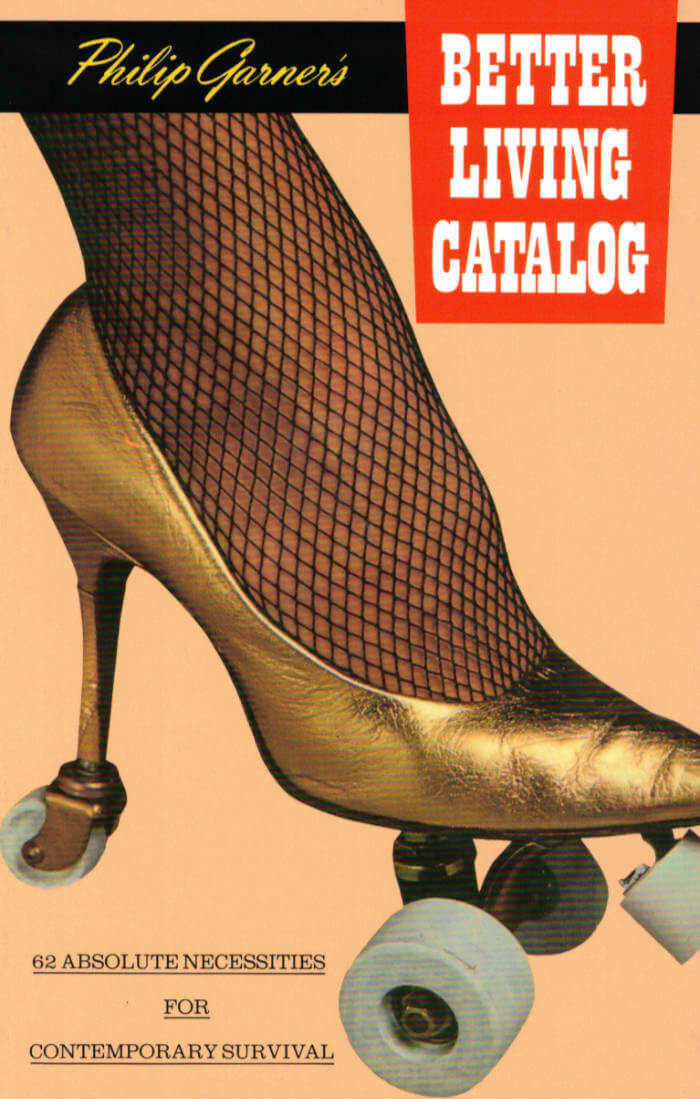Pippa Garner
Pippa Garner

Act Like You Know Me
The first comprehensive monograph and critical survey of American artist Pippa Garner, Act Like You Know Me surveys fifty years of her radical and transdisciplinary art practice, from the late 1960s to the early 2010s, through ca. 400 photographs, illustration, ephemera, and original writings.
Encompassing Garner's most iconic works, from the Backwards Car to the Half-Suit, alongside never-before-seen photographs and ephemera, Act Like You Know Me serves to introduce a highly-influential, under-recognized artist whose uncompromising approach to life and practice has allowed her to interact with the worlds of illustration, editorial, television, and art without ever becoming beholden to them.
Published on the occasion of Pippa Garner's travelling exhibition at Kunstverein Munich, Kunsthalle Zurich, Frac Lorraine (Metz) and White Columns (NYC).
Born in the suburbs of Chicago in 1942, Pippa Garner (formerly known as Philip Garner) has satirized American-style consumerism for decades, reifying the joys of everyday life and personal liberation along her way. With her prankish sense of humour and conceptual dedication to experimental engineering, she has altered materials of mass production—from Fordism through the pharmacopornographic era—subverting commercial binaries to reveal the transitory nature of material life and her own transpersonal identity.
Edited by Fiona Alison Duncan and Maurin Dietrich.
Texts by Pippa Garner, Shola von Reinhold, Dodie Bellamy, Fiona Alison Duncan.

Better Living Catalog
Pippa Garner’s Better Living Catalog, originally published in 1982, takes the form of a mail order catalog featuring clever and whimsical inventions that parody consumer goods while simultaneously critiquing America’s obsession with ingenuity, efficiency, leisure, and comfort. These works, which were made as prototypes and photographed for the publication, take the form of improbable accessories, clothing, footwear, home appliances, and office gadgets.
For example, the “Reactiononometer,” a portable wristband, instantly measures social success, while the “Digital Diet Loafers” display the wearer’s weight with every step. If the “Munch-o-Matic” reduces deskwork interruptions by flinging a snack right into the user’s mouth, other items promise financial solvency (the controlled cash flow “Autowallet”), sustainable waste management, or mess-free companionship (the “Pet-a-Vision” TV console). The artist asserts that all of the products in the book are “absolute necessities for contemporary survival.”
The Better Living Catalog was a pop hit when it was published, earning Garner spots on nighttime TV talk shows and attention from magazines like Vogue and Rolling Stone. In a meme-filled culture, the works still resonate today, finding their analog in widely-circulating consumer products, and—in the case of the “High Heel Skates”—even appearing unattributed in the runway collection of a major luxury fashion brand.
A few years after the Better Living Catalog was published, Garner began her gender transition, which she has characterized as an artistic project that draws conceptual parallels to the altered consumer goods she has continued to create since the 1970s. The artist’s practice has always been about hacking—gender hacking, she stated, was “an excellent premise for maverick conceptual art and diametrically opposed to anything I’d ever done.”
Many of the prototypes Garner created for the publication were repurposed or recycled, making this previously rare gem of an artist book one of the artist’s few works to now be widely available.
Born in 1942 in Evanston, Illinois, Pippa Garner (formerly known as Philip Garner) began her practice in the late sixties as a member of the highly regarded Transportation Design department at ArtCenter, California, with plans to become a car stylist, and was drafted to Vietnam to serve as a combat illustrator. In the mid-80s, Garner began her gender transition, which she considers a conceptual artwork, marking an extension of her practice from twenty years of altering cars, garments, and consumer products to using her own body as raw material. Garner appeared on the Tonight Show Starring Johnny Carson and other talk shows, showcasing her satirical consumer product inventions, and her artwork has been featured in Car & Driver, Rolling Stone, Arts & Architecture, and Vogue, among other publications. In the 1980s, her performance, design, and video work was exhibited in institutions including the Los Angeles Institute of Contemporary Art; Whitney Museum of American Art; and Museum of Contemporary Art, Los Angeles; since 2015, she has had exhibitions at STARS, O-Town House, Redling Fine Art, and Parker gallery in Los Angeles; Jeffrey Stark in New York; JOAN, Los Angeles; Kunstverein München; 49 Nord 6 Est – Frac Lorraine, Metz; Kunsthalle Zurich; and Art Omi, Ghent, New York. She is the author of three other books: Utopia… or Bust! Products for the Perfect World (1984), Garner’s Gizmos & Gadgets (1987), and the zine Beauty 2000 (1992/2021).
And more

Le Chauffage #3 - Day Job
Francesca Percival, Felix Rapp and 1 more
The third issue of Le Chauffage is an inquiry into the relationship between the practices of artists/ writers and their day jobs. This subject stems from a question fundamental to the existing mandate of Le Chauffage: 'how do you keep warm?' and subsequently, 'how do you pay the bills?' As these perennial concerns occupy our everyday lives, we ask artists/writers to consider the influence that their day jobs, side hustles, creative or non- creative forms of employment have on their respective practices.
This issue tries to account for the significant ways in which complex economic realities come to shape the art we produce, look at, and discuss. How do we deal with limited time and resources? How do we reclaim and steal time back? How do our day jobs shape and influence what we make? How do we subvert the means of production of the workplace? Can the constraint of a day job also be a way to alleviate the pressure of professionalising?
With contributions by Daniel Bozhkov, Nathan Crompton Pippa Garner, Chauncey Hare Marisa Kriangwiwat Holmes, Garrett Lockhart, Jannis Marwitz Reba Maybury, Tiziana La Melia, Dan Miller, Ragen Moss, Jean Luc Moulène, Jean Katambayi Mukendi Paul Niedermayer, Sophie Nys, Megan Plunkett, Chris Reinecke, Jacquelyn Zong Li Ross On Gabrielle L Hirondelle Hill Margaux Schwarz, Eleanor Ivory Weber James Welling, Werker, The Wig.